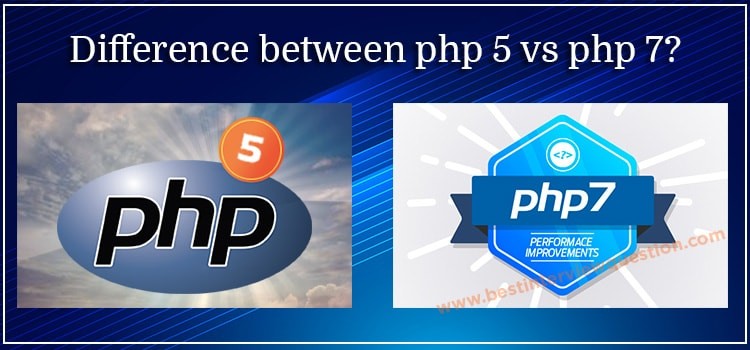What is the difference between php5 and php7

Difference between php 5 vs php 7
The difference between PHP5 and PHP7 is a trending question asked in interviews. Check out PHP interview questions, if you are looking for specific details. In this blog, we have tried to compile all the differences in an easy to read format with examples where required. Before comparing both the php versions, let’s have a quick overview of each where we would discuss features of each and then quickly review the related functions.
Why we used PHP?
The below chart shows how popular PHP is amongst all the programming languages used by developers across the world.

PHP is the most popular server-side scripting language has become an industry-standard since its inception in 1994. It is widely popular because of its high-speed performance and secure connectivity to the database. Besides, PHP is completely open-source and can run on all the major platforms like Unix, Windows, and Linux. There are many robust frameworks based on PHP that are quite popular and easy to code on.
PHP7
PHP7, as per programmers has a great future. Though the predecessor was unofficially PHP6, it never got released. As a result, PHP5 is the predecessor of PHP7. PHP7 is also called as PHP-NextGen and is the latest version of PHP. This version offers many benefits compared to all the previous PHP versions, the main one being performance.
Other than super high performance, PHP7 sees several important features added like better exception hierarchy and handling, removal of deprecated methods, anonymous classes, abstract syntax tree, and efficient memory usage. PHP7 also supports return type declarations.
Advanced features of PHP7
PHP7 offers to restructure the OOPS concepts for the modularity of PHP. Powered by Zend Engine 3.0, PHP7 has 2 times the performance and half the memory consumption compared to any of the previous versions.
Here are some more features that make php7 more advanced and powerful –
- Scalar Type declarations for more control over the code
- Return type declarations
- Spaceship (three-way comparison) operator
- CSPRNG functions
- Constant arrays using define().
PHP5
Php5 is the successor of php4 and has a completely reworked objected-oriented model with constructors, interfaces, static and final properties and methods, abstract classes, and many more essential improvements. The changes from php4 have made php5 more robust and have a better exception handling mechanism. It also allows developers to pass objects by reference which was not present before.
Concerning the MySQL extension, PHP5 offers prepared statements, SSL connections, and multi-query functions. Read PHP interview questions on our website to get details on php5.
Advanced features of PHP5
Some unheard but important features of PHP5 include –
- Powerful OOPS (Object-oriented programming) support
- Completely overhauled MySQL extension
- Improvements to XML extensions
- Better error handling and exception handling for PHP5 errors
- Superior soap implementation
What is the difference between PHP 5 vs PHP 7?
With this knowledge in hand, we can safely jump into comparing both the versions. We have collated a few significant differences for your easy reference –
| Feature | Php7 | Php5 |
|---|---|---|
| Performance | Performance speed is double. Average requests per second are 44 when it is 22 in php5. | Performance is low compared to php7. |
| Return type | You can declare the return type.
Example – public function productName (int $id) : String { |
No provision for return type declaration |
| Exception handling | Major errors have been changed to exceptions making them easier to catch. | To handle fatal errors was a difficult task for developers. |
| Group use declaration | Using the use of declarations makes the code more readable and compact.use pkg\utility\{ClassA, ClassB, ClassC as C};Similarly, functions and constants can be declared using group use. |
Individual declarations for common namespaces.
For example – use pkg\utility\ClassA; |
| Support for 64-bit | Supports 64-bit integers and large files. | It doesn't support 64-bit integer. |
| Anonymous class | A developer can create an anonymous class for a one-off use, rather than creating a full definition of a class that is required only once in the entire application. | There is no concept of anonymous classes. |
| Three-way comparison operator (spaceship operator) | This operator <==> can compare greater, less than, equal comparisons at the same time.
For example –$value = $age1 <=> $age2; |
A lot of operators have to be used for comparison –$value = ($age1 > $age2) ? 'Age1 is greater' : 'Age2 is greater'; |
| Null coalescing operator | This operator ?? returns the value of a variable if available, else returns null. $subject = return $_get[‘subject’]?? Null; |
The developer has to write explicit code to return the null value if the value is not available.if (isset ($_get [‘subject’])) |
On our website Best Interview Question, you can find technical interview questions and answers for all the trending technologies, languages, OS, database, design, front end, HR, SEO and much more. The questions are written by people who have been involved in taking technical interviews. The answers are crisp as expected by the interviewer. You can read the topic of the question wise or search for a specific question through our search option. If you feel any answer is not appropriate, feel free to write your answer. Please don’t forget to mark a yes if the answers have helped you.
